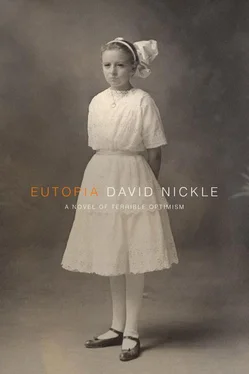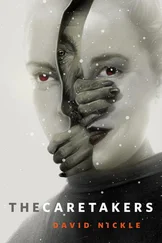“Children!” he shouted. “Dinner! Hop to it please—plenty of time for horseshoes later!”
And then Ruth Harper stood, and between finger and thumb, she took hold of his little finger on his right hand, and by that lifted him to his feet.
“We are summoned, Mr. Thistledown,” she said. “Best we do not tarry. The guests shall become restless.”
§
“Quite a crowd, isn’t it?” said Ruth. “Have you ever seen that many people at once, Jason?”
“Sure,” said Jason, although he could swear there were twice as many as there were before they started playing at horseshoes.
“Ever seen so many so fine?” she asked.
Jason looked—but try as he might, he couldn’t figure what she was talking about. Were they fine? Finer than others? Mr. Harper seemed to like them—he was striding on ahead, into the midst of a group of men who had the hard look of lumberjacks, bellowing his welcome at them.
And with that, they headed down the hill and into the midst of Garrison Harper’s picnic, and as they jostled through the crowd, Jason thought Ruth was right. He hadn’t seen a bunch of folk like this before—and the number of them didn’t have anything to do with it. This place was supposed to be a Utopia—something like Heaven on earth, designed to fit with some grand idea that Mr. Harper had come upon. And as he wandered through the crowds of people with Ruth and Louise, making their way towards the food, it dawned on Jason that as much as his aunt had talked on about free medical care and good working conditions in the mill, he had never fully fathomed exactly what that idea was.
But as he was moving among these folk, he thought he might be getting a better inkling. They were tall—not one of them who was an adult was any shorter than Jason. They seemed pretty strong too. And as to the ladies? They were lean and comely, in the main—good matches for the men they accompanied. And Jason had spent some time with Aunt Germaine and knew of the infirmities that she looked for doing her work—there was no sign he could tell of idiocy or lunacy in their faces; nothing of the mongrel or the degenerate.
In fact, one might wonder just what profit Aunt Germaine and the Eugenics Records Office might find spending time here. Aunt Germaine told him that they were looking for the bottom ten percent of the world.
And here—at least judging by the strong arms and the clean brows—Jason figured there wouldn’t be anyone in that bottom percentage. And then another thought came to him—a recollection not of the quarantine, but of that other awful place, Cracked Wheel. Those days he and his aunt had hid out in the town offices, and she’d told him what was what about Dr. Charles Davenport and the ERO.
Why not look for the top ten percent ? he’d asked her.
Why not indeed ? That’d been her answer. Jason wondered now if he asked Garrison Harper the same question, he’d say anything different.
§
The sun had passed its height by the time Jason had himself a plate full of some of the finest food he’d tasted, but he had lost sight of Ruth. He spotted Louise Butler, though, at a long table half-full of folk, so went and asked if he might join her. She smiled and said he might, so he set his plate down, put a leg over the bench and asked her a bit about herself. She was more conversational on her own, but only a little, and Jason still had to draw it out of her.
Where was she from again now?— Evanston, Illinois, thank you. What business were her folks in?— Dry goods, Mr. Thistledown . And she and Ruth Harper attended school together?— Yes thank you . In Chicago?— Not far from Chicago. That is correct . Did she ever read the Bulfinch’s at that school of hers?
“The—Bulfinch’s? I am sorry, Mr. Thistledown. I’m not familiar with that text.”
“Mythology,” said Jason. “The Greeks and such.”
“Oh,” she said. “The Greeks. I’ve tried to read some of Homer. Not my cup of tea.”
Jason took a mouthful of mashed potatoes soaked in butter. He swallowed and set down his fork. “You figure where Miss Harper’s got to?”
“No doubt avoiding that man’s speech,” said Louise.
“Beg your pardon?” asked Jason. He followed the tines of Louise’s fork where she indicated, and added, “Oh.”
Nils Bergstrom had arrived. He wore a light summer jacket and a hunting cap, and he’d climbed onto a table in the middle of the crowd. He wavered on his feet, and Louise commented disapprovingly: “He looks drunk.”
Bergstrom might have been drunk, but if so, he wasn’t drunk in the way that Jason understood a man could get: first too familiar, filled with great love, which could change in an instant to a fountain of murderous rage. Bergstrom seemed to move too easily, his arms swung too slowly.
If he spoke, Jason might have been able to tell from that. For drunk men in Jason’s experience couldn’t quite say anything without stumbling and slurring. But it wasn’t speech that came from Nils Bergstrom’s open mouth.
“Is he whistling?” whispered Louise, and Jason shook his head.
“Mouth’s wide open. Maybe it’s some of those folk.”
Jason pointed now, at a couple of men at a table nearer Bergstrom, who were standing up now and swaying as well. Jason could hear the tuneless whistling and soon placed it. His eyes flickered shut, and he stood in the quarantine, before a great pair of barn-board doors—doors that were shut for now, but from which a terrible light might emerge… .
The whistling stopped.
“Is that your aunt?” said Louise, and Jason opened his eyes.
“It is,” he said.
Germaine Frost took Bergstrom by the arm, and helped him down from the table. Bergstrom shook his head as she patted his shoulder, and led him back toward the house.
“It would seem that she saved the day,” said Louise.
With shaking hand, Jason lifted his fork and dug into his mashed potatoes. They were like paste in his mouth, but he made himself swallow them. A fellow could see spectres in all sorts of places, even hear them, in a woodsman’s whistle.
“Why don’t you tell me about the Harpers?” he said finally, and Louise laughed.
“What an excellent idea,” she said.
§
“Well,” said Ruth Harper some time later. “Aren’t you two a pair?”
Jason looked up. Ruth stood behind and between the two of them. She held a dark wooden box under one arm and rested her other hand on Louise’s shoulder. Louise started at her school friend’s touch, like she’d been accused of something.
“Oh yes,” said Jason. “I have been learning all sorts of things about the Harpers from Miss Butler.”
“Have you now?” Ruth gave Louise a light slap on her shoulder. Jason winked at Louise—shocking her, and shocking himself a little bit. Seeing Dr. Bergstrom finally, in full inebriation seemed to have stoked Jason’s confidence. Maybe past what was reasonable.
If that were so, Jason had no problem with it. A few minutes ago, as the table was clearing and the other guests went off to join games that Mr. Harper had organized nearby, the notion had alighted on Jason: he was taking pleasure at the picnic. His aunt, the doctor—his dead mama’s ghost—the horror in the quarantine—all of that was tucked away. This was more pleasure than he had ever expected to see.
“For instance,” said Jason, but before he could continue Ruth interrupted.
“You can tell me everything another time,” she said. “For now—I’ve something I want to show you. Come.”
Jason stood up, but when Louise tried to stand, Ruth gently pushed her back down. “I think you have had enough excitement for today. Jason—come with me. We shall have a walk in the orchard. Would you carry this?” She handed Jason the box, and he took it. It was heavy—Jason guessed whatever was inside was made of iron. But he could not tell what it was.
Читать дальше









![David Jagusson - Fesselspiele mit Meister David [Hardcore BDSM]](/books/486693/david-jagusson-fesselspiele-mit-meister-david-har-thumb.webp)


